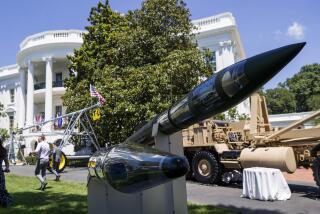U.S. May Send Israel Advanced New Arms : Security: Clinton seeks to reassure ally of Washington’s commitment. Technology-sharing seen.
- Share via
WASHINGTON — The Clinton Administration is considering the transfer of sophisticated new weaponry to Israel as concrete evidence of its pledge to strengthen Israel’s security in the wake of its agreement with the Palestine Liberation Organization, U.S. officials said Tuesday.
President Clinton publicly has sought to reassure the Israeli people that the United States remains unalterably committed to protecting Israel, even as Washington sponsors the creation of an independent Palestinian entity on Israel’s borders.
The President privately told Israeli Prime Minister Yitzhak Rabin on Monday after the signing of the Israel-PLO peace accord that the United States was prepared to share some advanced military technology that until now has been withheld from Israel, a White House official said.
Clinton signaled the willingness to improve the quality of military equipment made available to Israel in an interview with Israel Television broadcast Monday night.
“We may wind up doing more in terms of shared technology,” Clinton said. “We want to do some more joint strategic thinking just to recognize the fact that military technology itself has changed the dimensions of what Israel has to do to protect its security.”
Clinton said he promised Rabin that he would use “the influence and the power” of the United States to make sure that Israel feels “more secure, not less secure,” because of the agreement.
One senior Administration official said discussions already are under way on a new sale of fighter jets to Israel.
“I don’t think the Israelis have indicated which aircraft it is they want to buy, and as far as I’m aware, there’s no delay or no problem involved there,” he said.
Another official, referring to possible sale of new military technology to Israel, said that “a lot of things are on the table” as part of the U.S. pledge to guarantee Israel’s continued military superiority in the Middle East.
Officials would not discuss any specific military projects. The United States and Israel have worked jointly on a variety of military projects including fighter aircraft, missile defense, surveillance systems and electronic warfare equipment. The United States has helped Israel’s military maintain a qualitative edge over its Arab neighbors but has not always shared the latest generation of its weapons systems.
During the 1991 Persian Gulf War, the United States placed Patriot missile batteries in Israel to help defend against Scud missiles launched by Iraq. The defensive missiles were largely ineffective, however, and Israel is building its own anti-missile system, the Arrow, with U.S. financial and technical support.
The United States provides $3.1 billion a year in security-related assistance to Israel, and Clinton has assured Jerusalem that the amount will not be reduced any time soon.
Israel has asked for extra money to help pay for redeploying its troops from the Gaza Strip and Jericho and setting up new security arrangements on the periphery of the occupied territories. The Administration has not yet decided whether it will honor the request, officials said.
Clinton repeatedly stressed the U.S. commitment to Israeli security not only in the Israeli television interview, which was seen in Israel as well as in Jordan, Lebanon and the occupied territories, but also in a separate interview on Arabic Television.
“I have no intention of doing anything on my own which would in any way raise the question in the mind of any citizen of Israel that the United States is weakening its support for the security of Israel,” Clinton said in the Israeli interview. “The only way we can make this work is if every day more and more and more Israelis believe that they will be more secure if there is a just peace.”
On Arabic Television, Clinton said: “All the progress yet to be made depends upon the conviction of the people of Israel that they are secure and that making peace makes them more secure. So I don’t think anyone in the Arab world should want me to do anything that makes the Israelis feel less secure.”
Clinton’s emphasis on U.S. commitment to Israel’s defense is aimed at American Jews as well as a queasy Israeli public, whose faith in the deal with the PLO is crucial to its success.
Both groups need constant reassurance that the U.S. President is wholeheartedly behind the Jewish state, according to Abraham Foxman, executive director of the Anti-Defamation League.
“The greater the risk Israel takes, the greater the reassurance it needs from its friend and ally that it will be supportive,” Foxman said. “It’s a need Israel has domestically and in its bilateral relations with the Arab world, so they don’t think Israel is dealing out of weakness or being forced or pressured by the United States.”
More to Read
Sign up for Essential California
The most important California stories and recommendations in your inbox every morning.
You may occasionally receive promotional content from the Los Angeles Times.










